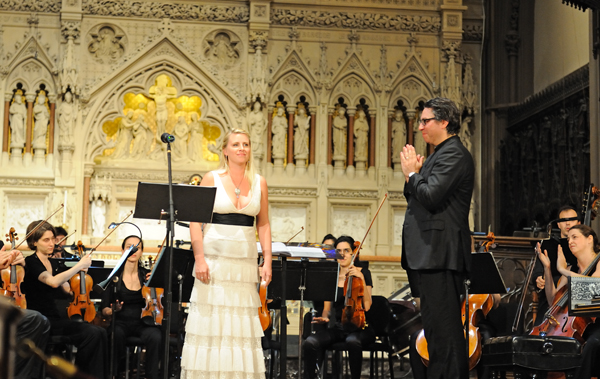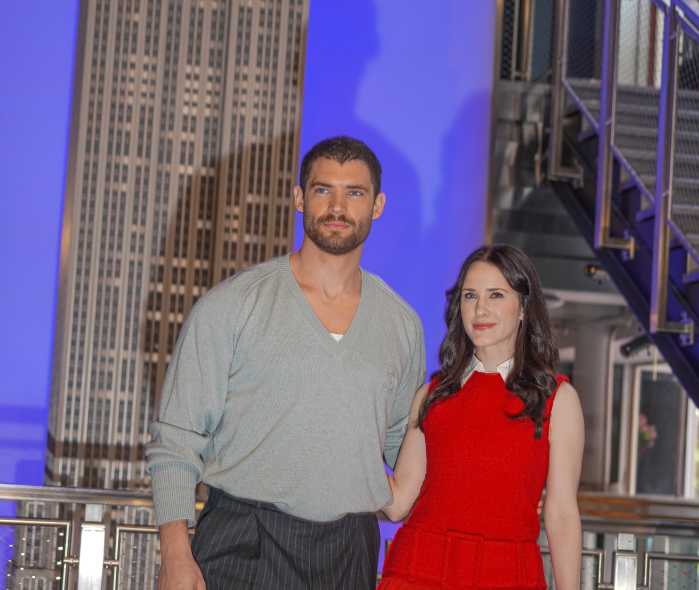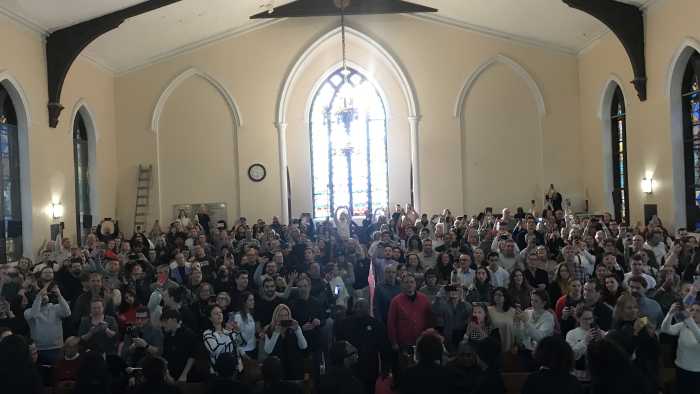
BY TERESE LOEB KREUZER | (ORIGINALLY PUBLISHED Sept. 22) From now through Jan. 2 Trinity Wall Street celebrates the centenary of Benjamin Britten’s birth by performing almost everything the renowned English composer ever wrote.
“I don’t think that anything like this has been done before,” said Julian Wachner, Trinity’s director of music and the arts. “We’ll be doing all the chamber music, all the vocal and chamber works, all the choral works, all the works for children.”
This amounts to around 100 pieces, rolled out at the rate of three or four a week during Trinity’s Thursday Concerts at One, its 11:15 a.m. Sunday worship service, its Bach at One and its 8 p.m. Sunday Compline by Candlelight. Most of the concerts are free.
Everything except Britten’s operas and his large-scale works are part of the festival.
Britten achieved both popular and critical success during his lifetime. Though the son of a dentist in class-conscious Britain, Queen Elizabeth II made him a peer. When he died in 1976 at the age of 63, he was Baron Britten, and could have been buried in Westminster Abbey along with the other luminaries of British artistic, scientific and political history.
He chose instead to be buried in the churchyard of Aldeburgh, a small, seaside town in Suffolk, where he and his romantic partner and muse, tenor Peter Pears, had established a music festival in 1948. When Pears died in 1986, he was buried next to Britten as they both had wished.
Many of Britten’s works are on Christian themes and are suffused with an Anglican sensibility.
“Of Britten’s choral music, maybe 80 percent of it is sacred,” said Wachner. “His operas are not, but they all reference this British world with vicars — there’s always a vicar. There’s a vicar in ‘Albert Herring’ [a chamber opera in three acts] and there’s a parson and a vicar and a Methodist minister in ‘Peter Grimes.’ So he’s living in a world of Anglicanism.”
Wachner said that Britten was probably more of a secular humanist than a dogmatic Anglican.
“He was a pacifist,” Wachner said. “He was an open homosexual at a time when that was actually illegal in England. When he died, Queen Elizabeth wrote a letter of consolation to Peter Pears, which was kind of extraordinary.”
Wachner, who turns 44 this month, has been performing Britten’s music since he was seven years old and sang Britten’s “Te Deum in C” in a choir in Buffalo, N.Y.
“When I was young, I studied and performed all of his choral music,” he said. “In my early 20’s, I started working with the operatic repertoire. Now is the first time that I’m getting to know the chamber music.”
Like Britten, Wachner is a composer and pianist as well as a conductor. On Sept. 5 in the opening concert of the Britten festival, for instance, he paused in his conducting to sit down at a harpsichord and accompany mezzo-soprano Virginia Warnken as she sang “Phaedra,” Britten’s last completed work, which he wrote in 1975 for Dame Janet Baker.
For that same concert, Wachner programmed “Sinfonietta,” Opus 1, written in 1932 when Britten was a student at the Royal College of Music.
“For me, what’s interesting are the similarities between these pieces that were written more than 40 years apart,” said Wachner. “Britten sprang from childhood fully formed in some ways.”
Most of the pieces in Trinity’s Britten festival are not part of the frequently performed repertory. The musicians come from the Trinity Wall Street choir, the Trinity Youth Chorus and NOVUS NY, Trinity’s new music ensemble. The scope and volume of the works they must learn for the festival are a measure of their professionalism.
On Nov. 11, when the group performs Britten’s “Cantata Misericordium,” it will be after only one rehearsal, for instance, though most pieces will be presented following two rehearsals and a dress rehearsal. “These players are fantastic,” said Wachner. “They’re pretty quick with it.”
Many of the soloists come from the ranks of the Trinity Choir. However, some have concert careers outside of the Trinity fold.
Tenor Nicholas Phan, who sang “Nocturne” in the opening concert of the Britten festival on Sept. 5 (a role that Britten wrote for Peter Pears), returned on Sept. 21 for one of the two ticketed concerts of the series. (The other concert requiring a ticket is the gala closing concert on Jan. 2, 2014.)
Skillfully accompanied by pianist Myra Huang, harpist Sivan Magen and French horn player Jennifer Montone, Phan memorably expressed the pain, passion and rage in Britten’s music. Even when the composer was ostensibly being light-hearted, the sadness is there. The concert took its title, “Still Falls the Rain,” from a poem by Edith Sitwell written about the London air raids of 1940. “Still falls the Rain — dark as the world of man, black as our loss,” the poem begins. Britten set it to music in 1954 as a memorial to his friend, pianist Noel Mewton-Wood.
In addition to his work for Trinity Wall Street, Wachner is music director and conductor of The Washington Chorus in Washington, D.C. On Nov. 3 at the Kennedy Center, Wachner will be conducting Britten’s “War Requiem.” Written for soloists, chorus, chamber ensemble and orchestra, it commemorates the dead of both World Wars.
Many people consider the “War Requiem” to be one of Britten’s masterpieces, but as Trinity Wall Street’s Britten festival will demonstrate, Britten’s artistry and his ability to marry music and texts can be found in his works both large and small.




































